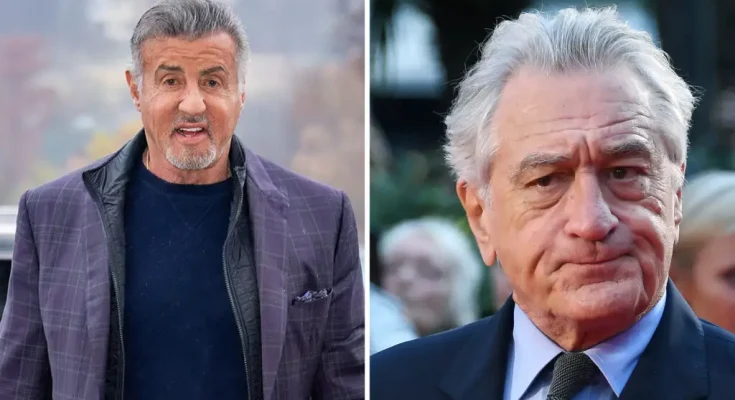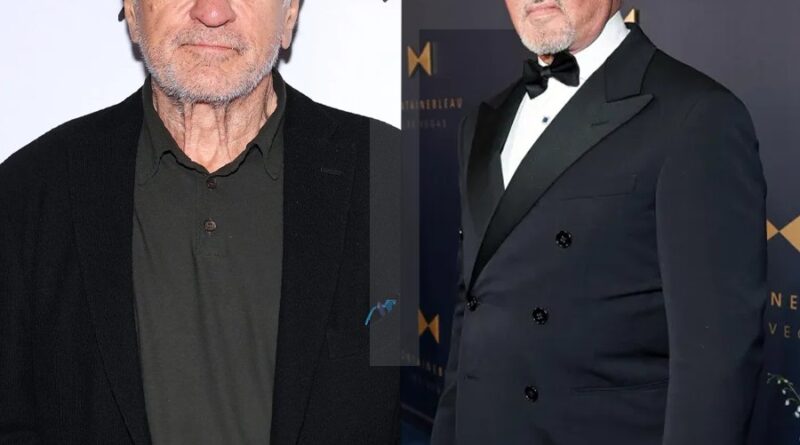“He’s Too Much Woke”: Sylvester Stallone Backs Out of $1 Billion Project, Citing Issues with ‘Creepy’ Robert De Niro, Sparking Controversy and Speculation in Hollywood

In a surprising turn of events, Hollywood is abuzz with the news that Sylvester Stallone has decided to drop out of a colossal $1 billion project, citing what he deems as Robert De Niro’s excessive ‘wokeness.’ Stallone, a cinematic icon renowned for his roles in the “Rocky” and “Rambo” franchises, made the announcement, igniting discussions about the delicate balance between personal beliefs and professional collaborations within the entertainment industry. This article delves into the details surrounding the project, Stallone’s decision, and the broader implications of ideological differences in Hollywood.
The now-jeopardized project, initially shrouded in secrecy, promised to be a blockbuster venture with a staggering $1 billion budget. Fans and industry insiders alike were eager to witness the collaboration between two Hollywood legends, Sylvester Stallone and Robert De Niro. However, Stallone’s unexpected exit has cast a shadow over the project’s future, leaving both the studio and audiences in suspense about its fate.
Sources close to the production suggest that Stallone’s decision to withdraw from the project stems from a fundamental clash of ideologies with De Niro, particularly related to what some label as the growing trend of ‘wokeness’ in Hollywood. While De Niro has been an outspoken advocate for social and political causes, Stallone, known for his action-packed roles, reportedly found the project’s thematic direction to be excessively aligned with what he perceives as a politically correct narrative.
Sylvester Stallone has built an enduring legacy in Hollywood through his iconic portrayals of characters like Rocky Balboa and John Rambo. His decision to step back from a billion-dollar project raises questions about the influence of personal convictions on professional collaborations, especially considering Stallone’s historic association with physically demanding and action-packed roles that have resonated with audiences globally.
Robert De Niro, celebrated for his versatile performances and vocal advocacy for social justice, has become synonymous with the term ‘woke’ in Hollywood. While the actor’s political activism has earned him admiration from many quarters, it appears that Stallone’s departure underscores the challenges of finding common ground when it comes to the evolving social and political landscape within the entertainment industry.
In his official statement regarding the departure, Stallone remarked, “I have the utmost respect for Robert, but the project has taken a direction that I believe is too much ‘woke’ for my artistic sensibilities. I wish them the best, but it’s not the path I envisioned for this collaboration.” The use of the term ‘woke’ in Stallone’s statement highlights the ongoing conversation within the industry about the impact of social and political ideologies on creative projects.
News of Stallone’s exit from the $1 billion project has triggered varied reactions within the industry. Some argue that personal ideologies should not hinder artistic collaborations, emphasizing the need for diversity of thought within creative endeavors. Others contend that artists should have the freedom to express their concerns when they feel a project deviates from their artistic vision.
The clash between Stallone and De Niro is not the first instance of ideological differences impacting Hollywood projects. The industry, often seen as a platform for liberal values, is grappling with how to navigate diverse perspectives while continuing to produce compelling and inclusive content. Stallone’s departure adds another layer to the ongoing conversation about creative freedom and the impact of political correctness on artistic expression.
Beyond the specific project, Stallone’s exit prompts reflection on the broader implications for Hollywood and the entertainment industry. As society becomes increasingly polarized, the industry faces the challenge of balancing creative expression with commercial viability. The incident underscores the need for open dialogue and a nuanced understanding of the complexities surrounding differing ideologies within the creative space.
Sylvester Stallone’s decision to drop out of a $1 billion project with Robert De Niro over ideological differences serves as a reminder of the delicate balance between personal convictions and professional collaborations in Hollywood. The clash of ideologies between these two cinematic titans adds to the ongoing conversation about artistic freedom, political correctness, and the challenges of navigating diverse perspectives within the entertainment industry. As the incident reverberates through Hollywood, it prompts contemplation on the future of collaborative projects and the evolving dynamics of ideological differences within the creative realm.
